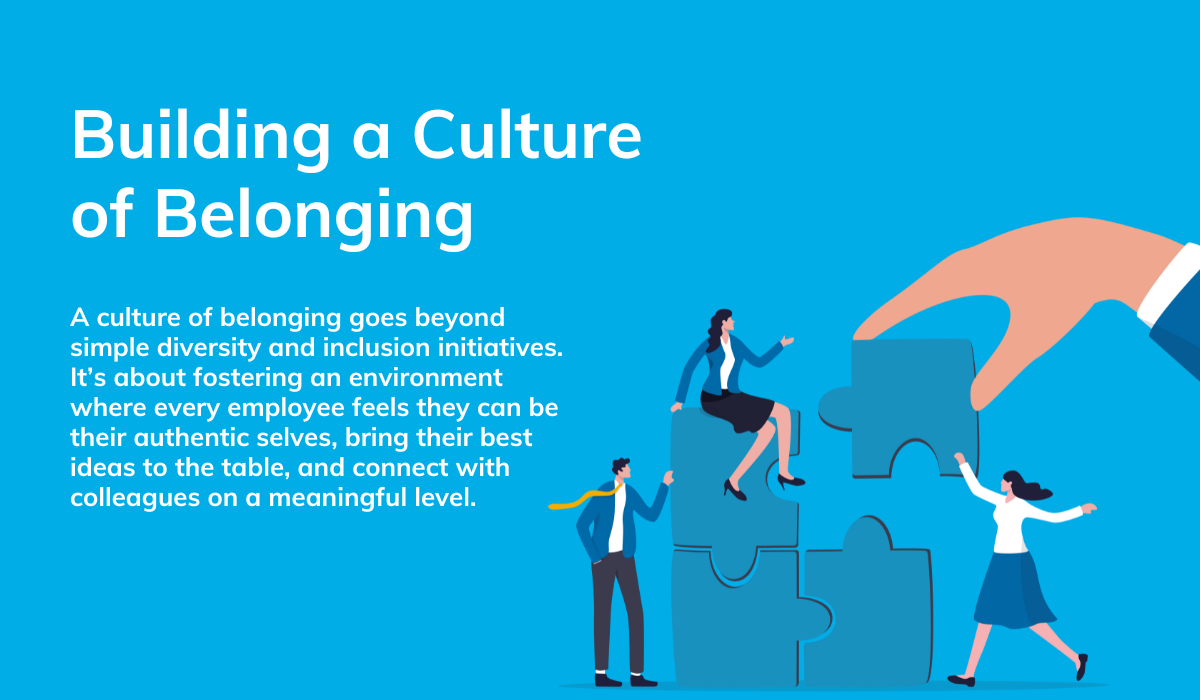Attracting and retaining top talent is every company’s priority – and, if it isn’t, it should be. Beyond competitive salaries and benefits, what truly sets an organisation apart is its company culture. A key element of a thriving culture is a strong sense of belonging, where employees feel valued, respected, and empowered to contribute their unique perspectives.
 What is a Culture of Belonging?
What is a Culture of Belonging?
A culture of belonging goes beyond simple diversity and inclusion (DE&I) initiatives. It’s about fostering an environment where every employee feels they can be their authentic selves, bring their best ideas to the table, and connect with colleagues on a meaningful level. It’s about psychological safety – knowing that it’s okay to take risks, make mistakes, and learn from them in a supportive atmosphere.
Why Does Belonging Matter?
The benefits of a culture of belonging are far-reaching. When employees feel like they belong, they’re more likely to be:
- Engaged: They’re invested in the company’s success and motivated to go the extra mile.
- Productive: Collaboration and innovation flourish when diverse perspectives are valued and heard.
- Loyal: A sense of belonging fosters employee retention, reducing costly turnover.
- Creative: When employees feel safe to share ideas, it leads to a more innovative and adaptable workforce.
Building Belonging in Your Workplace
Creating a culture of belonging is an ongoing process, but here are some key strategies to get you started:
Leadership Commitment: Senior leadership needs to champion belonging as a core value. This means actively participating in DE&I initiatives, publicly recognizing employee contributions, and holding themselves accountable for fostering an inclusive environment.
Define Your Values: Clearly define your company’s values and ensure they emphasise belonging and respect for all. These values should permeate every aspect of the organization, from hiring practices to performance reviews.
Inclusive Hiring: Move beyond traditional CV and focus on creating a diverse talent pool. Utilise diverse interview panels and unconscious bias training for hiring managers.
Psychological Safety: Encourage open communication and feedback by actively listening to employee concerns and ideas. Normalize making mistakes as a learning opportunity.
Employee Resource Groups (ERGs): Support the creation of ERGs where employees with shared backgrounds or interests can connect and build community.
Mentorship Programs: Mentorship programs can provide valuable guidance and support for underrepresented employees, fostering career development and a sense of belonging.
Celebrate Diversity: Recognise and celebrate the unique experiences and perspectives your employees bring to the table. Organise events that showcase different cultures and backgrounds.
Open Communication: Maintain open communication channels so employees feel comfortable raising concerns or offering suggestions. Regularly solicit feedback through surveys, focus groups, or anonymous suggestion boxes.
Be Flexible: Acknowledge that work-life balance is important for everyone. Offer flexible work arrangements, remote work options, and parental leave policies that cater to diverse needs.
Recognise and Reward: Publicly recognize and reward employees who exemplify the company’s values and contribute to an inclusive culture.
Building a culture of belonging is an investment in your most valuable asset – your people. By implementing these strategies, you can create a workplace where everyone feels welcome, valued, and empowered to reach their full potential.
Taking Action
Start your journey towards a more inclusive workplace with these actionable steps:
- Review your company’s mission statement and core values. Do they reflect a commitment to belonging?
- Assess your current company culture. Talk to employees and conduct surveys to understand how they feel about inclusion and belonging.
- Develop an action plan with specific goals and initiatives to promote belonging.
- Building a culture of belonging is an ongoing process, but the rewards are significant. By fostering an environment where everyone feels valued and respected, you can create a more engaged, productive, and successful organisation.
Did you find this helpful? Share this article with a friend or colleague.

